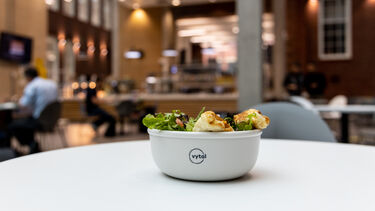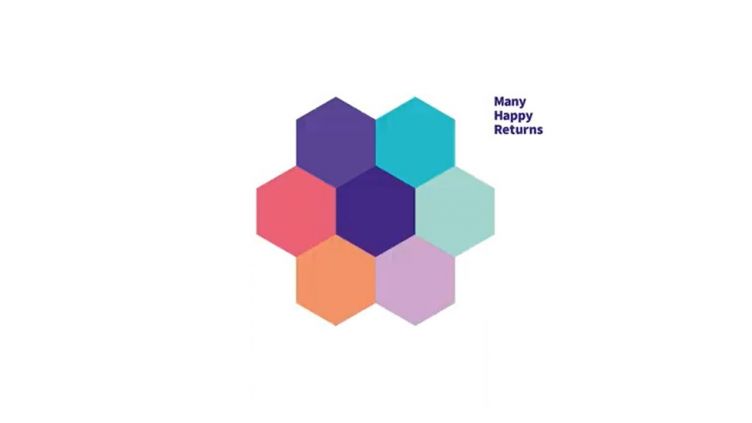Many Happy Returns – enabling reusable packaging systems
Many Happy Returns aims to enable reusable packaging systems and so reduce the need for single-use plastic.

Recycling has become the norm for addressing plastic waste. But recycling is challenging – and it encourages a throwaway culture. Instead of recycling, Many Happy Returns (MHR) explores reusable packaging systems. By keeping packaging material in circulation for as long as possible, reuse systems could reduce the environmental impact of plastic.
Our team will research consumer reactions to reusable packaging and the role of language in encouraging reuse. Also they will examine the technical and scientific basis for making reusable packaging. Plus they will work closely with manufacturers, designers, brand owners, retailers and policy makers.
Themes
MHR's work was split into 5 themes or work packages.
Language: What does our language use reveal about how we conceptualise plastics use, reuse, and recycling?
Social Change: Understanding social change, from single-use to reuse.
Willingness: What are people willing to reuse, when, and why?
Life-Cycle: Where and when is a model of reuse better than the alternatives?
Technology: What are the best materials for refillable and returnable packaging systems?
Plus the team is collaborating on 2 proof-of-concept studies. Together they are exploring the introduction of reusable packaging systems in takeaway food and dairy products.
Multidisciplinary Experts
As with all our research, the Many Happy Returns team are from varied disciplines. For instance, we have people from the University of Sheffield’s English and Psychology Departments as well as chemists and engineers. Find out more about the team.
Our chemists and engineers will be conducting life cycle analyses to study reuse systems ‘from cradle to grave’ and therefore identify which systems confer the most benefit, for what and when.
But what role does a linguist have in reducing plastic waste? And why are insights from psychology useful?
Well, a reuse system is no good if people won't use it. So, we will explore the language that is used by people and organisations to describe plastics and identify how language can be used as a tool to change behaviour. The School of English wrote a great piece explaining more about this.
Alongside this, psychology will help us to identify what people are willing to reuse, what factors influence these decisions, and at what point reuse becomes unacceptable.
Project partners include: Morrisons, Ocado, Co-op, M&S, Nestle, packaging manufacturer Berry Global, design agency Touch, and zero-waste store pioneers Unpackaged and OPRL (On Pack Recycling Label).
Our Funding
Many Happy Returns (MHR) was announced in December 2020. Our funding is part of the Smart Sustainable Plastic Packaging challenge at UK Research and Innovation. SSPP aims to establish the UK as an innovator in developing sustainable plastic packaging, with a view to significantly reduce plastic pollution by 2025.
You can read the UKRI news story about this funding award here.
Reuse on The University of Sheffield campus
The MHR team and Accommodation & Commercial Services at the University of Sheffield bring reuse to TUoS cafes.
Vytal is a reusable container scheme now in cafes across TUoS campus. To date, this has saved over 10,000 single use packages from being used. The Vytal reuse scheme is continuing past the end of the Many Happy Returns project and is available at Heartspace Cafe, Diamond Kitchen, Jessops Cafe, the Social Science Cafe, and Cafe 1828.
You can download the VYTAL app today to reduce packaging waste.
How to Talk About Plastics
Our team of linguists have produced a short guide for businesses and other organisations on ‘How to Talk About Plastics’. It provides some key recommendations on how to use language more effectively to encourage reuse before recycling.
The aim is to help organisations to use the right language in their marketing, advertising, instructional information, and general communications to encourage more pro-environmental behaviour and more plastics reuse.
Find out more or watch our video introducing the guide.
'Reuse, Refill, Rethink' - Display at Museum of Brands
A display that used the past as a guide for informing the future of sustainability in packaging was on show at London's Museum of Brands as a collaboration with Many Happy Returns. 'Reuse, Refill, Rethink' opened on 15 November 2023, running until 15 May 2024.
The display showcased a variety of products and demonstrated the difference between refillable, returnable (prefill) and repurposed product packaging of the past, present, and future. It explored how current developments in packaging have historical significance and how we might learn from the past when envisioning new models of reuse for the future.
Many Happy Returns contributes to Efra Committee report on global plastic waste pollution
Professor Rachael Rothman (GCSF Director and MHR CO-I) gave evidence in person as well as written evidence. And MHR's Sarah Greenwood, Dr Rorie Parsons, and Professor Thomas Webb all gave written evidence too.
One of the key conclusions of the Environment, Food and Rural Affairs Committee report is a call for a ban on the export of all plastic waste from the UK by 2027.
Rachael explained why a ban on exporting plastic waste is so important. 'If we want to be a world leader in sustainability, we must act like a leader and set an example for other countries to follow - this starts by ending the practice of shipping our plastic waste abroad for other countries to deal with.'
Find out more: MPs and Sheffield researchers call for ban on all plastic waste exports.
Reusability by Design
Plastics resource efficiency and recycling charity, RECOUP launches ‘Reusability by Design’ guidance.
The guide assists stakeholders with the design of reusable plastic packaging. It is designed to be used by packaging manufacturers, packer/fillers, brands, retailers, consumers, service providers and waste management companies.
The guidance has been produced as a workstream of the UKRI funded TRACE project, led by Pragmatic, with RECOUP, The University of Sheffield, Topolytics, AMRC (Advanced Manufacturing Research Centre) and Ken Mills Engineering as partners.
‘Reusability by Design’ is available to download for FREE from the RECOUP website.

